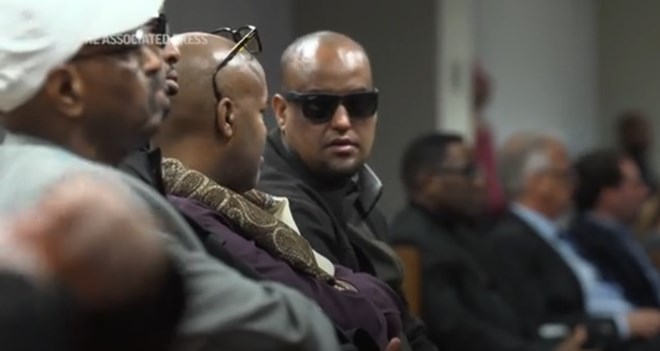
Wednesday April 17, 2024

Somali rideshare drivers gather in anticipation at City Hall as the Minneapolis City Council votes on delaying a crucial minimum pay ordinance. CREDIT/ Screengrab/ AP video
MINNEAPOLIS (HOL) — Amid legislative uncertainty surrounding ride-hailing pay in Minneapolis, Uber has closed its driver resource center in south Minneapolis.
Known as the "Greenlight Hub," the center provided essential in-person support for drivers, including help with document submission, vehicle inspections, and other issues. The closure on Monday left five employees with severance packages as Uber prepares for possible operational changes in the Twin Cities metro area.
The decision came as part of Uber's reaction to the Minneapolis City Council's planned minimum pay ordinance, which was postponed last week from May 1 to July 1. Both Uber and its competitor Lyft had threatened to cease operations in the city when the initial implementation date was set. However, following the delay, they agreed to continue their services temporarily. Last week, the Minneapolis City Council approved a two-month delay for new rules that would raise pay for ride hailing drivers.
"While the office is closed as we evaluate our operations here, our lease extends through January," said Uber spokesman Josh Gold. He added that there are no immediate plans to reopen the facility but did not rule out future provisions if circumstances change.
The controversy stems from a broader legislative effort to address what many see as exploitative practices within the ride-hailing industry. The proposed ordinance mandates that drivers be compensated at least $1.40 per mile and 50 cents per minute during passenger transport, with a minimum of $5 per trip.
Uber and Lyft have argued that such measures could force them to curtail their services in the region, potentially impacting their operational model. In contrast, council members and supporters of the ordinance believe it establishes a fairer wage system and could serve as a model for other cities.
City Council members Robin Wonsley and Aurin Chowdhury, along with Council President Elliott Payne, emphasized that the two-month delay in implementing the city's pay ordinance would "lead to better outcomes" and ensure all Minnesota rideshare drivers earn at least the minimum wage. The pause is expected to give time for new rideshare apps to enter the market.
City Council member Jamal Osman said the extension was a token of "good faith on our side," but that "the threat of Uber and Lyfy holding us (City Council) hostage is still out there.
As Uber withdraws direct support for its drivers, other organizations are stepping in. Lyft has announced a collaboration with the Minnesota Uber/Lyft Drivers Association (MULDA), which is prominently composed of East African immigrants. However, on Tuesday, MULDA President Eid Ali stated that a formal contract has yet to be finalized. This group, primarily advocating for driver rights, provides support services, including translation and assistance with onboarding and appeals. It currently supports drivers from its office in Bloomington at 1701 American Blvd E, Suite 16.
MULDA has been at the forefront of these discussions in response to drivers' long-standing complaints about decreasing fare shares, unsafe working conditions, and ride-hailing companies' lack of transparency.
Minnesota's rideshare drivers, numbering between 10,000 and 12,000, report that Uber and Lyft retain 40 to 70% of the fares, leaving them earning less than minimum wage and struggling to cover expenses like gas, car repairs, and basic living costs. Uber and Lyft challenge these claims and have recently revised their policies to ensure drivers receive 70% of the fares, excluding fees.
Legislative support has also been robust. U.S. Rep. Ilhan Omar and state Rep. Mohamud Noor, both vocal advocates for labour rights, have been instrumental in pushing for legislative changes that would redefine the employment status of gig workers, aiming to afford them greater protections under state law.
Additionally, a state task force recommended the establishment of a funded driver resource center to support ride-hailing employees. Although no definitive funding source was agreed upon, suggestions included an additional rider fee. The task force highlighted the need for such a center to be a nonprofit with expertise in culturally competent services for drivers.
This legislative landscape is further complicated by separate proposals introduced at the city and state levels offering slightly different pay rates and provisions for passengers requiring wheelchair accessibility.
Mayor Jacob Frey, reflecting on the council's decision to delay the ordinance, noted, "A delay is not a fix. While the council continues to make a mess of this, I'll be working with policymakers and partners from across the disability, hospitality, and business communities to find a path forward for drivers and riders."
If Uber and Lyft decide to exit, four companies have applied for ridesharing licenses in Minneapolis thus far and are awaiting approval: Moov, MyWeels, Wridz, and Joiryde. Six additional companies have indicated interest in joining the local market but still need to submit license applications. Among them is California-based Hich MN, which attended the meeting on Thursday. A seventh group, a cooperative owned by local drivers and partnered with MULDA, is also expected to apply for a license.
Starting a rideshare business in the Twin Cities comes with several costs. In Minneapolis, you will need to pay a licensing fee of $37,000 and a wheelchair accessibility fee of $10,000. In Saint Paul, the licensing fee is $41,000. Furthermore, MSP Airport requires a $10,000 security deposit and a $500 licensing fee.